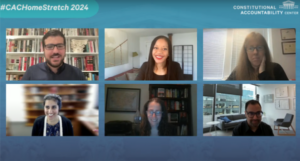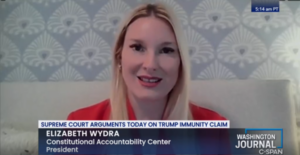May 2024 Newsletter: In the Home Stretch of a Momentous Supreme Court Term

On April 30th, CAC hosted its eleventh annual Home Stretch at the Supreme Court panel. The event kicked off with opening remarks by Elizabeth Wydra, who discussed what a truly momentous term this is shaping up to be. Then, panelists Easha Anand of Stanford’s Supreme Court Litigation Clinic, Professor Khiara Bridges of UC-Berkeley School of Law, Kelsi Brown Corkran of Georgetown’s Institute for Constitutional Advocacy and Protection, Deepak Gupta of Gupta Wessler, and Brianne Gorod of CAC discussed some of the term’s biggest cases in a conversation moderated by Slate’s Mark Joseph Stern.
The panelists began the conversation by discussing the Court and the upcoming 2024 election, including the two cases with, as Mark Joseph Stern put it, Trump in the name of the case. Brianne Gorod noted the Court’s quick resolution of the Trump ballot eligibility case and explained why the Court should resolve the Trump immunity case no less quickly. Emphasizing the high stakes of this term, Professor Bridges then discussed the Court’s abortion cases. Discussing the challenge to the accessibility of the most common abortion medication regimen, Professor Bridges explained that this case highlights the importance of agency deference: when it comes to medicine, “Who are we going to trust, agency scientists or judges?” Finally, Easha Anand discussed the gun cases the Court is hearing this term, Rahimi and Cargill, and discussed how they stood out as examples of this Court’s struggles in engaging with—or not engaging with—text and history.
Turning to economic issues at the Court, Kelsi Brown Corkran discussed Grants Pass v. Johnson, a case she argued before the Supreme Court. Grants Pass’s ban on unhoused people sheltering with as little as a blanket is clearly, as our brief argues, cruel and unusual punishment prohibited by the Eighth Amendment. Deepak Gupta then discussed the attacks on agency deference and the significant consequences that could result if decisions about how best to interpret and implement statutes are transferred from expert agencies to generalist judges. Finally, our panel discussed how these cases, like the attack on the constitutionality of the funding of the Consumer Financial Protection Bureau, represent part of a larger assault on the government’s ability to function effectively and do its work on behalf of the American people.
In closing, our panelists shared their thoughts on the role of text, history, and originalism at the Supreme Court. As Brianne Gorod discussed, it is certainly the case that the conservatives on the Court are sometimes “selective originalists,” failing to engage meaningfully with the text and history of the Constitution, but it is also the case that there are categories in which arguments grounded in text and history help produce important victories, even with this incredibly conservative Court.
That’s why CAC will continue to fight for the progressive promise of the Constitution’s text and history—and also make clear when justices on the Court fail to adhere to that text and history.
The panelists discussed all this and much, much more. If you weren’t able to catch the panel live, it’s not too late: it’s available to watch here. Check it out as we await the final decisions of the term!
![]()
- Tennessee v. Becerra — The United States Court of Appeals for the Sixth Circuit is considering whether Title X reproductive healthcare clinics in Tennessee can defy the federal requirement to offer counseling and referral for abortion when requested by a patient. Tennessee argues that, under the Spending Clause of the Constitution, the state was never obligated to comply with the federal requirement because it was set forth in a regulation as opposed to a statute. CAC’s brief explains why this understanding of the Spending Clause is wrong as matter of Supreme Court precedent and is at odds with longstanding historical practice. Sixth Circuit, filed May 3.
- Bristol Myers Squibb v. Becerra; Janssen v. Becerra — CAC WIN — The United States District Court for the District of New Jersey held that the Inflation Reduction Act’s Medicare drug price negotiation program does not constitute a taking under the Constitution’s Takings Clause. Echoing our brief, the court noted that “[s]elling to Medicare may be less profitable than it was before the institution of the Program, but that does not make Defendants’ decision to participate any less voluntary.” District of New Jersey, decision rendered April 29.
- Williams v. Washington — The Supreme Court is considering whether states may force civil rights litigants who bring claims against state officials in state court under Section 1983 to first exhaust their administrative remedies. CAC’s brief explains why they can’t: such a requirement is at odds with the text and history of Section 1983, as well as Supreme Court precedent. Supreme Court, filed April 18.
- Muldrow v. City of St. Louis — CAC WIN — In a unanimous ruling, the Supreme Court held that employees challenging a job transfer under Title VII need not demonstrate that the transfer resulted in a “materially significant” harm. Echoing our brief’s textual analysis, the Court explained that “the text of Title VII imposes no such requirement.” Supreme Court, decision rendered April 17
- Alpha Phi Alpha Fraternity, Inc. v. Secretary, State of Georgia; Pendergrass v. Secretary, State of Georgia; Grant v. Secretary, State of Georgia — The United States Court of Appeals for the Eleventh Circuit is considering whether the Voting Rights Act’s prohibition on vote dilution is a constitutional exercise of Congress’s Fifteenth Amendment enforcement power. Drawing on both the text and history of the Fifteenth Amendment, as well as Supreme Court precedent, CAC’s brief demonstrates why it is. Eleventh Circuit, filed April 15.
- Bissonnette v. LePage Bakeries Park St., LLC — CAC WIN — In a unanimous decision, the Supreme Court held that transportation workers do not need to demonstrate that they work in the so-called “transportation industry” in order to be exempt from the Federal Arbitration Act. Echoing the straightforward textual analysis we presented in our amicus brief, the Court explained that, as the Chief Justice put it, the exemption “says nothing to direct courts to consider the industry of a worker’s employer.” Supreme Court, decision rendered April 12.
- Sheetz v. County of El Dorado, California — The Supreme Court held that the Takings Clause does not distinguish between legislative and administrative permit conditions, but it did not determine whether the Traffic Impact Mitigation fee program at issue constitutes a taking. Instead, the Court sent that question back to the California Court of Appeal. Supreme Court, decision rendered April 12.
![]()

- April 25: CAC President Elizabeth Wydra appeared on C-SPAN to discuss the arguments before the Supreme Court in the presidential immunity case, Trump v. United States. “TV (C-SPAN): CAC’s Wydra Discusses Trump Immunity Case at Supreme Court.”
- April 29: CAC’s brief in Trump v. United States was cited in an article in Roll Call that discusses how the upcoming ruling in the case could affect Congress’s impeachment power. “Supreme Court ruling on Trump immunity could alter impeachment.”
- April 26: CAC’s Vice President Praveen Fernandes was quoted in an article in the Atlantic discussing what’s at stake in Trump v. United States. “The Trumpification of the Supreme Court.”
- A pril 25: CAC President Elizabeth Wydra joined Bloomberg’s Balance of Power Podcast to discuss the issues in Trump v. United States. “Balance of Power Podcast: Supreme Court Hears Trump Immunity Arguments.”
- April 25: CAC Appellate Counsel Smita Ghosh joined National Constitution Center’s We the People podcast to preview the oral argument in Trump v. United States. “Is President Trump Immune From Prosecution?.”
- April 24: CAC Appellate Counsel Smita Ghosh was quoted in an article in Bloomberg Law discussing how the Supreme Court justices might address the questions in Trump v. United States. “US Supreme Court to Parse Official Acts in Trump Immunity Fight.”
- April 23: CAC Counsel Nina Henry was quoted in an article in Bloomberg Law discussing the ongoing litigation regarding the Medicare drug price negotiation program and how it relates to the Takings Clause of the Constitution. “Drug Price Program Legal Fight Shifts Focus to Property Rights.”
- April 22: CAC Appellate Counsel Smita Ghosh was featured on Gray TV discussing the case Starbucks v. McKinney and the federal labor law history that’s relevant to the case. “TV (Gray TV): CAC’s Ghosh Joins Gray TV to Discuss NLRB Case at Supreme Court.”
- April 19: CAC Civil and Human Rights Director Gans published an article in Slate discussing his forthcoming article in the George Washington Law Review, which discusses how the Fourteenth Amendment can be used to fight economic inequality. “Will the Supreme Court Uphold the 14th Amendment and Block an Oregon Law Criminalizing Homelessness?.”
- April 18: CAC’s brief in the Title VII case Muldrow v. City of St. Louis was summarized in an article in Fortune that discusses the Supreme Court’s recent ruling in the case. “DEI critics were hoping that the Supreme Court’s Muldrow decision would undermine corporate diversity programs. It does no such thing.”
- April 15: CAC Deputy Chief Counsel Brian Frazelle appeared on Gray TV to discuss the case Chiaverini v. City of Napoleon, Ohio. “TV (Gray TV): CAC’s Frazelle Joins Gray TV to Discuss Fourth Amendment Case at Supreme Court.”

